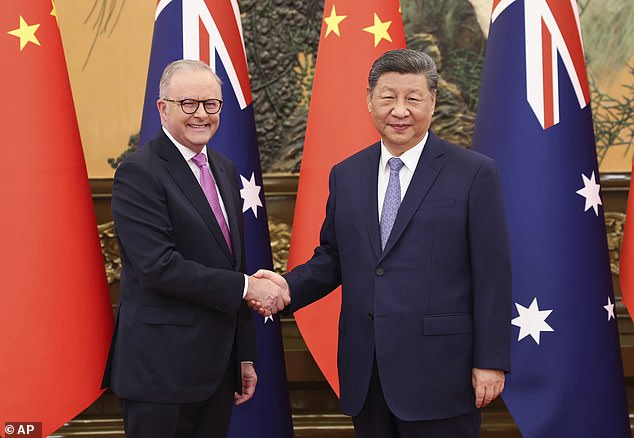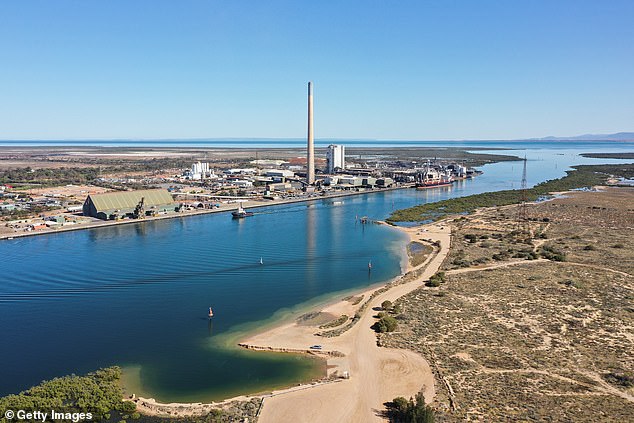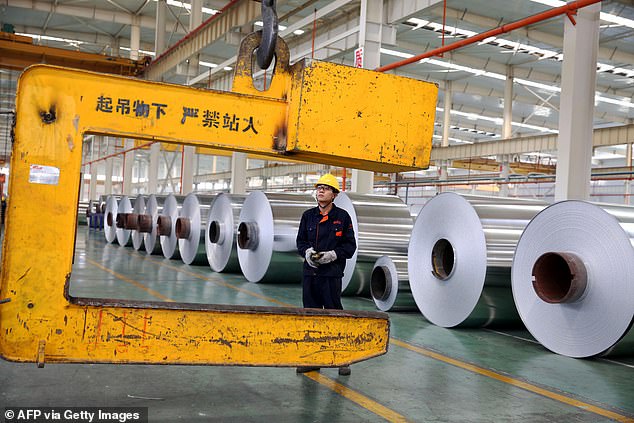Entire Australian towns could be ‘hollowed out’ and thousands left jobless as China‘s aggressive economic meddling drives local smelters and refineries to the brink, a damning new report has warned.
The McKell Institute has sounded the alarm, revealing that up to 73,000 jobs are now hanging in the balance across regional communities that rely on metal refining and smelting to survive.
In some towns, the fallout could be catastrophic, with up to 11 per cent of residents forced to pack up and leave if their local plants shut down.
The report singles out Port Pirie in South Australia – home to Nyrstar, one of the nation’s oldest smelters – warning the community faces ‘long-term collapse’ if the industry fails.
The facility is one of the world’s largest primary lead and zinc smelters.
At the heart of the crisis is Beijing‘s multibillion-dollar flood of industrial subsidies, which the report says now exceed even China’s defence spending – leaving Australian producers hopelessly outgunned in global markets.
McKell Institute chief executive Ed Cavanough warns that unless the Federal Government takes urgent action, Australia risks losing its foothold in critical mineral processing – and with it, the future of dozens of proud working towns.
‘We know that China is almost certainly spending more on industrial subsidisation than it is on defence,’ he said.

McKell Institute chief executive Ed Cavanough warns that unless the Federal Government takes urgent action, Australia risks losing its foothold in critical mineral processing. Anthony Albanese is pictured with Chinese President Xi Jinping

The commercial dock and lead smelter at Port Pirie in South Australia

A Chinese worker loads aluminium tapes at an aluminium production plant in Huaibei
‘In the short-term, China’s geoeconomic strategy is designed to onshore as much global heavy industrial capacity as possible.
‘In the longer-term the strategic goal is limiting the viability of critical manufacturing in competitor economies, including Australia.’
Mr Cavanough said this will create a huge long-term economic advantage for China, and hobble Australia’s industrial capacity.
‘Other nations have seen this and are responding strongly,’ he said.
‘Economies that wish to withstand future global economic shocks will need to be able to refine and process metals.
‘If Australia loses those capabilities, we leave ourselves massively exposed.’
Mr Cavanough criticised the Australian government for playing ‘industrial whack-a-mole’ by working with individual refiners to preserve individual plants as they come under threat.
‘This approach is not sustainable over the longer term,’ he said.

McKell Institute chief executive Ed Cavanough (pictured) says the Australian government needs to take action now to shore up its metal processing industry
‘If the Commonwealth government is serious about preserving Australia’s capacity to manufacture metals – as it should be – then we need decisive structural action now.’
Mr Cavanough noted South Australia was particularly vulnerable.
‘Our analysis shows that if the Port Pirie smelter were to close, the town’s population could drop by around 2,000 people – that’s 11 per cent – in the first year alone,’ he said.
‘These would be the town’s most economically productive residents leaving with their families.
‘South Australia simply cannot afford to lose industrial anchors such as the Port Pirie smelter – anchors that have sustained regional communities for generations.’
Among the report’s recommendations to the Albanese government include mandating a proportion of raw materials extracted from Australia must be refined here and strengthen domestic procurement requirements in major government projects.
Share or comment on this article:
How Australian towns could be wiped off the map after bombshell move from China
